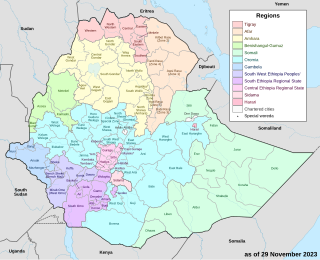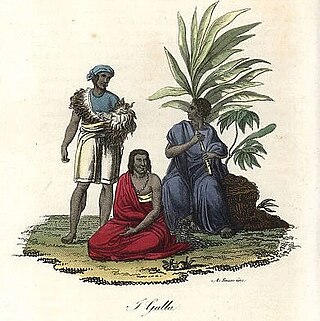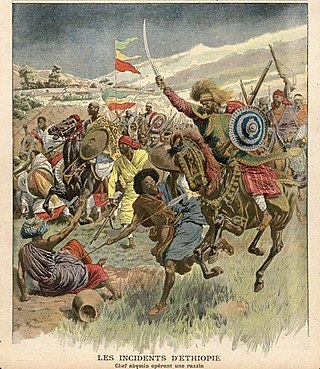Kaffa may refer to:
- Kaffa (city) or Theodosia, a Crimean city
- Kaffa Province, a former province in Ethiopia
- Kingdom of Kaffa, a medieval kingdom of the Kafficho people
Kaffa may refer to:

Kaffa was a province on the southwestern side of Ethiopia; its capital city was Bonga. Kaffa is bordered on the west by Sudan, on the northwest by Illubabor, on the north by Walega, on the northeast by Shewa, on the east by Sidamo, and on the southeast by Gamu-Gofa.

Jimma is the largest city in southwestern Oromia Region, Ethiopia. It is a special zone of the Oromia Region and is surrounded by Jimma Zone. It has a latitude and longitude of 7°40′N36°50′E. Prior to the 2007 census, Jimma was reorganized administratively as a special Zone.
Bonga is a town, woreda and one of the multicapital of the South West Ethiopia Peoples' Region in Ethiopia. Located in the Keffa Zone upon a hill in the upper Barta valley, it has a latitude and longitude of 7°16′N36°14′E with an elevation of 1,714 meters above sea level. Not confused with another town named "Bonga", near Gambela Region.

MotiAbba Jobir Abba Dula was the last King of the Gibe Kingdom of Jimma, and a member of the Oromo people. He was the grandson of Abba Jifar II. He aligned himself with the Italian occupation of Ethiopia.

The Kingdom of Jimma was an Oromo Muslim kingdom in the Gibe region of Ethiopia that emerged in the 18th century. It shared its western border with Limmu-Ennarea, its eastern border with the Sidamo Kingdom of Janjero, and was separated from the Kingdom of Kaffa to the south by the Gojeb River. Jimma was considered the most powerful militarily of the Gibe kingdoms.

The Gibe region was a historic region in modern southwestern Ethiopia, to the west of the Gibe and Omo Rivers, and north of the Gojeb. It was the location of the former Oromo and Sidama kingdoms of Gera, Gomma, Garo, Gumma, Jimma, and Limmu-Ennarea.

The Kingdom of Kaffa was a kingdom located in what is now Ethiopia from 1390 to 1897, with its first capital at Bonga. The Gojeb River formed its northern border, beyond which lay the Gibe kingdoms; to the east the territory of the Konta and Kullo peoples lay between Kaffa and the Omo River; to the south numerous subgroups of the Gimira people, and to the west lay the Majangir people. The native language, also known as Kaffa, is one of the Omotic group of languages.
Kafa or KAFA may refer to:

Jimma is a zone in Oromia Region of Ethiopia. Jimma is named after former Kingdom of Jimma, which was absorbed into the former province of Kaffa in 1932. Jimma is bordered on the south by the Southern Nations, Nationalities and Peoples Region, the northwest by Illubabor Zone, on the north by East Welega Zone and on the northeast by West Shewa Zone; part of the boundary with West Shewa Zone is defined by the Gibe River. The highest point in this zone is Mount Maigudo. Towns and cities in Jimma include Agaro, Limmu Inariya and Saqqa. The town of Jimma was separated from Jimma Zone and is a special zone now.
Chena is a district in the South West Region of Ethiopia. The name Chena comes from one of the provinces in the former Kingdom of Kaffa, whose administrative center had been at Wacha. Part of the Keffa Zone, Chena is bordered on the south by the Bench Maji Zone, on the west by Bita, on the north by Gewata, on the northeast by Ginbo, and on the east by Decha. Towns in Chena include Shishinda. Western kebeles of Chena were used to form Bita district.
Decha is a district in the South West Region of Ethiopia. The name Decha comes from one of the provinces in the former Kingdom of Kaffa, which had the approximately same boundaries. Part of the Keffa Zone, Decha is bordered on the south by the Omo River which separates it from the Debub Omo Zone, on the west by the Bench Maji Zone, on the northwest by Chena, on the north by Ginbo, on the northeast by Menjiwo, on the west by Telo and Cheta, and on the southeast by the Denchya River which separates it from the Konta special district. The major town in Decha is Chiri.
Ginbo is a district in the South West Region of Ethiopia. The name Ginbo comes from one of the provinces in the former Kingdom of Kaffa. That province, as well as the Kafficho provinces Bonga and Manjo, became districts with the Ethiopian conquest in 1896, and these districts were later merged to form the modern district.
Menjiwo is a district in the South West Region of Ethiopia. The name Menjiwo is derived from the province Manjo of the Kingdom of Kaffa; however, the province of Manjo lay within the boundaries of neighboring Ginbo, while Menjiwo occupies the lands of the Gallo province of the former kingdom. Part of the Keffa Zone, Menjiwo is bordered on the south by Telo, on the southwest by Decha, on the west by Ginbo, on the north by the Gojeb River which separates it from the Oromia Region, and on the east by the Konta special district. The major town in Menjiwo is Adiya Kaka.
Telo is a district in the South West Region of Ethiopia. The capital city is Oda. This district has its origins in the province Chetta of the former Kingdom of Kaffa. Part of the Keffa Zone, Telo is bordered on the south by Cheta, on the west by Decha, on the north by Menjiwo, and on the east by the Konta special district. Towns in Telo include Felege Selam. Cheta district was separated from Telo. In Telo district there are many tourism areas such as shinat ino, boreta valley (washa), shada earth ear, the 18th Kafa cemetery. In Telo there are 24 kebele and one district administration.
Keffa or Kaffa, is a zone in the South West Region of Ethiopia. The administrative center is Bonga.
Tekle Haymanot or Takla Haymanot is the name of several famous Ethiopians:

The Oromo expansions, also known as the Oromo migrations or the Oromo invasions, were a series of expansions in the 16th and 17th centuries by the Oromo. Prior to their great expansion in the 16th century, the Oromo inhabited only the area of what is now modern-day southern Ethiopia and northern Kenya. Over the centuries due to many factors, mostly the wars between Adal Sultanate and Ethiopia would further encourage the numerous Oromo tribes to expand towards central and eastern modern Ethiopia.
Kefa may refer to:

The Kafficho people are an ethnic group hailing from Ethiopia. As of 2007, they accounted for only 1.2% of Ethiopia's population. Most of the Kafficho live in Ethiopia's Kafa Zone, Southern Nations, Nationalities and People's Regional States region. Their traditional language, Kafa or Kaffinono, is still spoken among much of the population. Coffee may derive its name from the Kafa zone, where it was first cultivated, though this is considered unlikely.

Menelik's conquests, also known as the Agar Maqnat, were a series of expansionist wars and conquests carried out by Emperor Menelik II of Shewa to expand the Ethiopian Empire.